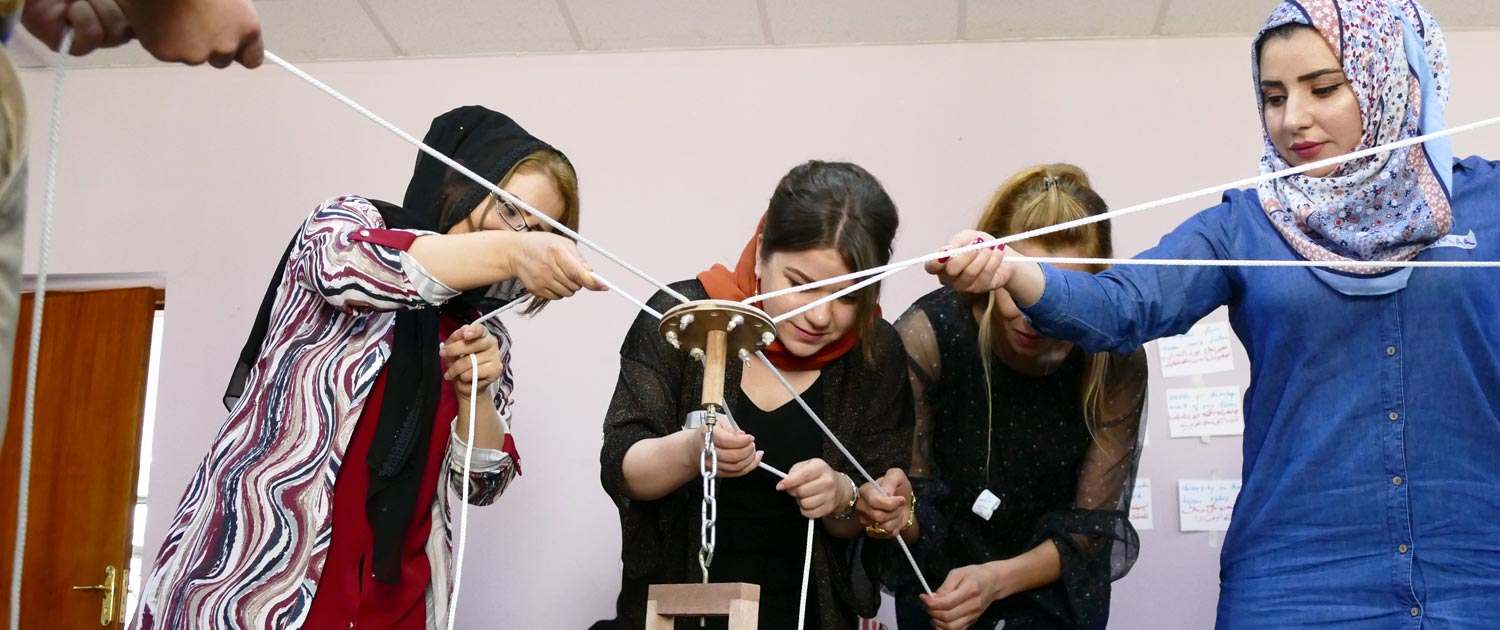What does teamwork mean?
Teamwork is the process of a small group working towards an ambitious goal through collaborative efforts.
Why is teamwork so important?
Working with a community needs different capacities: knowledge, skills and attitudes. A diverse team is well positioned to address different persons, aspects or issues in the community.
I am a good teamworker, but my colleagues are not!
How can I establish teamwork when working with a boss?
People who work for one organization are often referred to as a “team” – even though they may not have a common understanding of their goals, roles, and responsibilities. The boss, or team leader, should actively contribute to such a common understanding. Team members should demand this from their superiors. Superiors will accept this demand when they can be convinced that everyone will benefit from such common understanding. This process should not be mixed up with internal competition struggle.
What problems can occur while doing teamwork?
Sometimes, tasks that could be completed best by individuals are done as teamwork. Teamwork should only be practiced when offering a clear benefit over individual work, when the knowledge, skills and attitudes of different persons are needed to fulfill a task or achieve a goal.
All teams are groups of humans who need time to clarify roles and grove in to perform well. Conflicts are always rising. It can’t be avoided but can be handled well and used for improvement.
What are good techniques to make a team work successfully?
The goal has to be clear. The roles and responsibilities have to be well defined. Working and learning processes should be well structured and oriented to the goals and to the beneficiaries who will get the outputs.
How do I motivate team members to work?
Humans are motivated usually if they see meaning in what they are doing and if the goal is achievable but a bit challenging. A boring task is not motivating and the same applies to unrealistically high goals. Each team member should have a clear understanding of why his/her contribution is really needed and how it contributes to the bigger goal. Therefore piecemeal work is not helpful.
I am a teamleader – how do I get everyone to pull together?
How do I build a good team?
Select persons according to their strengths. Set up clear goals and show everyone how important he/she is to achieve it.
Trust the persons. Give everyone the space to achieve the goals in his/her own way.
What are the different roles in teams, and how do they affect each other?
When humans work together, there will always be someone who takes more initiative than others and acts as a leader. This person may tend to overestimate his/her own judgement and separate him/herself from the mainstream. Therefore, opponents will appear, criticizing the leader’s approach and goals. There also will be some followers of the leader who would rather act than talk about different views. And finally, there are bystanders, waiting for whatever happens.
Each persons in one of these roles will feel sometimes uncomfortable with the role of others. The leader will like the follower more than the bystander or the opponent. Opponents may be in competition with each other and find their arguments not sufficiently appreciated by the team members.
These roles are not bound to a person, they are not part of their character. A nice and kind person might be a great leader at a social center, but not at all in a football team. His opponent perhaps will be a great leader in a sport club. Thus, roles might vary according to circumstances and within one team.
For a team leader and also other team members, it is helpful to discover the right time and place for each role, that is: How can I make the best use possible of each role?
I am a teamleader – how do I get everyone to pull together?
How do I build a good team?
Select persons according to their strengths. Set up clear goals and show everyone how important he/she is to achieve it.
Trust the persons. Give everyone the space to achieve the goals in his/her own way.
What are the different roles in teams, and how do they affect each other?
When humans work together, there will always be someone who takes more initiative than others and acts as a leader. This person may tend to overestimate his/her own judgement and separate him/herself from the mainstream. Therefore, opponents will appear, criticizing the leader’s approach and goals. There also will be some followers of the leader who would rather act than talk about different views. And finally, there are bystanders, waiting for whatever happens.
Each persons in one of these roles will feel sometimes uncomfortable with the role of others. The leader will like the follower more than the bystander or the opponent. Opponents may be in competition with each other and find their arguments not sufficiently appreciated by the team members.
These roles are not bound to a person, they are not part of their character. A nice and kind person might be a great leader at a social center, but not at all in a football team. His opponent perhaps will be a great leader in a sport club. Thus, roles might vary according to circumstances and within one team.
For a team leader and also other team members, it is helpful to discover the right time and place for each role, that is: How can I make the best use possible of each role?



